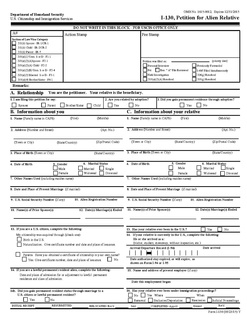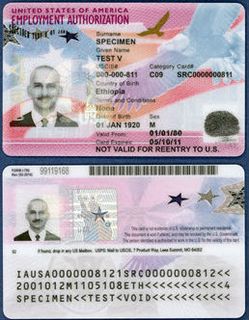
Lawful permanent residents, also known as legal permanent residents, and informally known as green card holders, are immigrants under the Immigration and Nationality Act (INA), with rights, benefits, and privileges to reside in the United States permanently. There are an estimated 13.2 million green card holders of whom 8.9 million are eligible for citizenship of the United States. Approximately 65,000 of them serve in the U.S. Armed Forces.
An L-1 visa is a visa document used to enter the United States for the purpose of work in L-1 status. It is a non-immigrant visa, and is valid for a relatively short amount of time, from three months to five years, based on a reciprocity schedule. With extensions, the maximum stay is seven years.
Waiver of inadmissibility under the Immigration and Nationality Act (INA) is a legal remedy available to every person found to be "removable" from the United States. It is statutorily linked to cancellation of removal, which is another form of relief under the INA that effectively operates parallel to waiver of inadmissibility.
Adjustment of status in the Immigration and Nationality Act (INA) of the United States refers to the legal process of conferring permanent residency upon any alien who is a refugee, asylum seeker, nonpermanent resident, conditional entrant, parolee, and so forth.
The Security Through Regularized Immigration and a Vibrant Economy Act of 2007 or STRIVE Act of 2007 is proposed United States legislation designed to address the problem of illegal immigration, introduced into the United States House of Representatives. Its supporters claim it would toughen border security, increase enforcement of and criminal penalties for illegal immigration, and establish an employment verification system to identify illegal aliens working in the United States. It would also establish new programs for both illegal aliens and new immigrant workers to achieve legal citizenship. Critics allege that the bill would turn law enforcement agencies into social welfare agencies as it would not allow CBP to detain illegal immigrants that are eligible for Z-visas and would grant amnesty to millions of illegal aliens with very few restrictions.
An L-2 visa is a visa document used to enter the United States by the dependent spouse and unmarried children under 21 years of age of qualified L-1 visa holders. It is a non-immigrant visa, and is only valid for the duration of the spouse's L-1 visa.
The U visa is a United States nonimmigrant visa which is set aside for victims of crimes who have suffered substantial mental or physical abuse while in the U.S. and who are willing to assist law enforcement and government officials in the investigation or prosecution of the criminal activity. It permits such victims to enter or remain in the US when they might not otherwise be able to do so.
Form I-129, Petition for a Nonimmigrant Worker is a form submitted to the United States Citizenship and Immigration Services used by employers or prospective employers to obtain a worker on a nonimmigrant visa status. Form I-129 is used to either file for a new status or a change of status, such as new, continuing or changed employer or title; or an amendment to the original application. Approval of the form makes the worker eligible to start or continue working at the job if already in the United States. If the worker is not already in the United States, an approved Form I-129 may be used to submit a visa application associated with that status. The form is 36 pages long and the instructions for the form are 29 pages long. It is one of the many USCIS immigration forms.
The United States Citizenship and Immigration Services (USCIS) issues a number of forms for people to submit to them relating to immigrant and non-immigrant visa statuses. These forms begin with the letter "I". None of the forms directly grants a United States visa, but approval of these forms may provide authorization for staying or extending one's stay in the United States as well as authorization for work. Some United States visas require an associated approved USCIS immigration form to be submitted as part of the application.

Form I-130, Petition for Alien Relative is a form submitted to the United States Citizenship and Immigration Services by a United States citizen or Lawful Permanent Resident petitioning for an immediate or close relative intending to immigrate to the United States. It is one of numerous USCIS immigration forms. As with all USCIS petitions, the person who submits the petition is called the petitioner and the relative on whose behalf the petition is made is called the beneficiary. The USCIS officer who evaluates the petition is called the adjudicator.
Form I-539, Application to Extend/Change Nonimmigrant Status is one of the forms issued by the United States Citizenship and Immigration Services. It is used by people currently in the United States in a non-immigrant status to change the classification for their status and/or extend their stay with their current status. Both the current status and the status to which the transition is being sought must be non-immigrant visa statuses.
The National Visa Center (NVC) is a center that is part of the U.S. Department of State that plays the role of holding United States immigrant visa petitions approved by the United States Citizenship and Immigration Services until an immigrant visa number becomes available for the petition, at which point it arranges for the visa applicant(s) to take the visa interview at a consulate abroad. It is located in Portsmouth, New Hampshire. It was established in 1994 on the site of an Air Force base that was closed down by The Pentagon.
The Legal Immigration Family Equity Act of 2000, also known as the LIFE Act and as the Legal Immigration and Family Equity Act, along with its Amendments, made some changes to laws surrounding immigration for family members of United States citizens and Lawful Permanent Residents, as well as people eligible for employment-based immigrant visas, in the direction of making it easier for family members and immigrant workers to move to and adjust status within the United States. It was passed on December 21, 2000.
Special Immigrant Juvenile Status (SIJS) is a special way for minors currently in the United States to adjust status to that of Lawful Permanent Resident despite unauthorized entry or unlawful presence in the United States, that might usually make them inadmissible to the United States and create bars to Adjustment of Status. The key criterion for SIJS is abuse, neglect, or abandonment by one or both parents.
Withdrawal of application for admission is an option that U.S. Department of Homeland Security might offer to an Arriving Alien whereby the alien chooses to withdraw his or her application to enter the United States, and immediately departs the United States. Unlike an order of removal, a withdrawal of application for admission does not create a bar to future entry.
Deferred inspection is a procedure in immigration enforcement in the United States for Arriving Aliens. Here, the final decision on whether to admit the Arriving Alien, instead of being conducted at the port of entry where the alien arrived, is deferred to be carried out later at a deferred inspection site, while the alien is paroled into the United States. The guidelines followed at the deferred inspection site are largely the same as those followed by the officers at the port of entry, and are described in the U.S. Customs and Border Protection's Inspector's Field Manual. Aliens do not accrue unlawful presence between the time of arrival and the date of deferred inspection, but they do begin to accrue unlawful presence after their parole ends, if they are not successfully admitted at the deferred inspection site by then. Note that the officers at both the port of entry and the deferred inspection site are part of the CBP Office of Field Operations.

Form I-140, Immigrant Petition for Alien Worker is a form submitted to the United States Citizenship and Immigration Services (USCIS) by a prospective employer to petition an alien to work in the US on a permanent basis. This is done in the case when the worker is deemed extraordinary in some sense or when qualified workers do not exist in the US. The employer who files is called the petitioner, and the alien employee is called the beneficiary; these two can coincide in the case of a self-petitioner. The form is 6 pages long with a separate 10-page instructions document as of 2016. It is one of the USCIS immigration forms.





